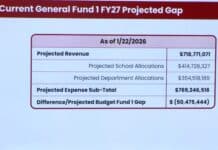The Minnesota Department of Education (MDE) has recently released the first working draft of the state’s K-12 academic standards in social studies.
Based on state law, the MDE is required to review and revise its state standards every 10 years. The 2011 social studies standards are up for review this year and will continue to be reviewed every 10 years thereafter.
This first draft of revisions “represents the work of the standards review committee” and a “shift in approach to standards and social studies learning,” according to the draft’s introduction.
The second draft will be published in February, with a final draft sent to the Minnesota Commissioner of Education in May. Once a final draft is approved, the standards go through Minnesota’s rule making process to become law.
While Minnesota does not have a statewide assessment in social studies, state statute requires that all public school students in Minnesota “satisfactorily” complete all social studies standards and their corresponding benchmarks in order to graduate. At the high school level, students must also earn 3.5 social studies credits.
These academic standards are intended to set the expectations for achievement in social studies for K-12 students in the state. The Minnesota Department of Education defines social studies as “the interdisciplinary study of citizenship and government, economics, geography, history, and other disciplines in the social sciences and humanities.”
After comparing the 2020 first draft of social studies standards to the 2011 social studies standards, there are several concerning omissions, revisions, and additions regarding the proposed social studies content that our K-12 students will or will not learn.
The public feedback and comment period about this first draft of social studies standards is currently open from now until January 4, 2021 at 5:00 p.m.
If you are a parent, educator, or member of the general public and you want to help make the second draft of standards better, email Doug Paulson, Director, at mde.academic-standards.state.mn.us. If your concerns are over additions or rewording in the 2020 first draft, please reference the specific benchmark number (such as those listed below in parentheses) in your correspondence to MDE.
While the Center recognizes this is a first draft and that it is challenging to capture every topic area within the key social studies disciplines, we believe there are improvements that can be made to the second draft. Below are our top five areas of concern.
WORLD/U.S. HISTORY
There are several key pieces of our world and nation’s history that are missing when compared with the 2011 social studies standards.
Missing Benchmarks
- World War I—benchmarks on the social, political and economic causes of the war; nations involved, major political and military figures, key battles; political impact (including formation of the League of Nations)
- World War II—benchmarks on the social, political and economic causes of the war, and main turning points; nations involved, major political and military figures, key battles; timeline of key events leading to WWII
- The Holocaust (including references to the Nazi regime and Jews)
- Rise and effects of communism and socialism; Communist Revolution
- American Revolution—benchmarks on timeline of the major events and turning points of the revolution, including the involvement of other nations and the reasons for American victory; identifying historically significant people during the period of the revolution (Examples: George Washington, Thomas Jefferson, Elizabeth Freeman)
- Civil War—benchmarks on timeline of the key events of the war; causes of the war; major political and military events; main ideas of the debate over slavery and states’ rights and how they resulted in major political compromises and ultimately war
Watered Down Benchmarks
- Vietnam War—not given its own benchmark as in 2011; referenced once in a 2020 benchmark on analyzing two ore more conflicting narratives about global conflict (19.9.2)
- China—no mention of contemporary China or China’s approach to Western influence (Opium Wars, Boxer Rebellion) as in 2011; one 2020 reference to analyzing daily life for people in the Han or Qin dynasty (19.3.2)
- Indigenous peoples is the only group named in reference to genocide (21.5.1), and genocide is only framed as a past occurrence (17.6.2)
MINNESOTA HISTORY
The history and culture of Minnesota’s Anishinaabe and Dakota peoples were included in five benchmarks in the 2011 standards. Their lives and perspective are important, but now with 15 benchmarks in the 2020 first draft specifically naming these two groups, there is concern this comes at the expense of other people groups and other history.
Missing Benchmarks
- The war-time experiences of Minnesota soldiers (1st Minnesota Infantry Regiment) and civilians
- The political and social culture of Minnesota during WWI and how it affected Minnesotans
- The contributions of Minnesota and its people to World War II; the impact of the war on the home front and Minnesota society after the war (Examples: Iron Range mining and steel production, Fort Snelling)
- How Minnesotans influenced, and were influenced by, the debates over the United States’ involvement in World War II
- The response of Minnesotans to global conflicts and displaced peoples since 1945
- The causes and effects of the United States Secret War in Laos and how Hmong allies were impacted
- Norman Bourlaug and the agricultural revolution he pioneered
PATRIOTISM
Watered Down Benchmarks
- 2011 benchmark: Explain why and when the Pledge of Allegiance is recited, provide examples of basic flag etiquette and other demonstrations of patriotism
- 2020 first draft: Investigate how people show patriotism (2.1.1)
Missing Benchmarks (from both 2011 standards and 2020 first draft)
- September 11
WIND AND SOLAR
We believe the 2020 first draft benchmark below is science related, not social studies.
- Examine how scientific knowledge of alternative forms of energy, such as wind and solar, have changed energy production in the United States over the past 20 years (16.8.2)
SYSTEMIC RACISM
New Benchmarks
- Learn to recognize unfairness, stereotypes, and bias on the individual level (e.g., biased speech) and injustice at the institutional or systemic level (e.g., discrimination) (22.1.1) *Note: this is a 1st grade benchmark
- Define freedom and democracy, and examine how different groups have been included or excluded from the ideals over American history (18.7.1)
Revised Benchmarks (italics=additions)
- 2011 benchmark: Describe the goals, offenses, penalties, long-term consequences, and privacy concerns of Minnesota’s juvenile justice system
- 2020 first draft: Describe the goals, offenses, penalties, long-term consequences, and privacy concerns of Minnesota’s juvenile justice system and evaluate the impact on Black, Indigenous, Persons of Color (BIPOC) communities (4.6.3)
- 2011 benchmark: Describe the processes that led to the territorial expansion of the United States, including the Louisiana Purchase and other land purchases, wars and treaties with foreign and Indigenous nations, and annexation
- 2020 first draft: Describe the tactics used by the United States government to claim Indigenous and Mexican land, including but not limited to an analysis of the ideology of Manifest Destiny and its relationship to whiteness, Christianity, and capitalism… (18.9.6)
- 2011 benchmark: Describe the content, context, and consequences of the 13th, 14th and 15th amendments; evaluate the successes and failures of the Reconstruction, including the election of 1876, in relation to freedom and equality across the nation
- 2020 first draft: Describe the content, context, and consequences of the 13th, 14th and 15th amendments and evaluate the successes and failures of the Reconstruction, including successful efforts to disenfranchise newly freed Black Americans, making sure to connect this history to persistent discrimination and inequity in the present (18.9.7)

Catrin Wigfall
Catrin Wigfall is a Policy Fellow at Center of the American Experiment.
Catrin’s experience in education and policy research began during her time with the Young Leaders Program at The Heritage Foundation. Her interest in education policy led her to spend two years teaching 5th grade general education and 6th grade Latin in Arizona as a Teach for America corps member. She then used her classroom experience to transition back into education policy work at the California Policy Center before joining American Experiment in February 2017.
Catrin graduated summa cum laude from Azusa Pacific University in California, where she earned a Bachelor of Arts degree in Political Science.











